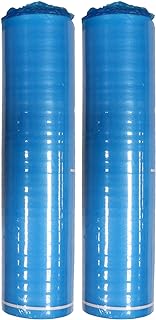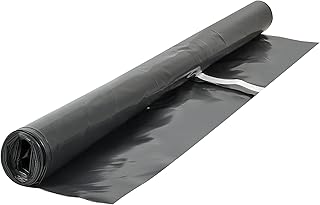5 important factors worth considering when looking for the best moisture barrier underlayments
When buying moisture barrier underlayments, there are important things to think about to make sure they work well. The quality of the material and how thick it is, as well as how well it resists moisture and if it is easy to install, all play a role in how well your flooring will last and work. With so many options available, it can be hard to choose, so it’s important to look closely at each one to see what sets them apart. By focusing on these important factors, buyers can make a more informed decision and pick an underlayment that fits their needs.
See our guide to the best moisture barrier underlayments.
Material composition
When buying moisture barrier underlayments, the type of material used is very important for how well it works and how long it will last. Choosing high-quality materials like rubber, cork, or felt can make a big difference in how well your underlayment performs. These materials are better at resisting moisture, are more durable, and help reduce noise, keeping your floors safe and comfortable for a long time. While these materials may cost more upfront, the benefits over time are worth it.
On the other hand, using underlayments made from cheaper materials like foam or low-quality plastics can make your floors more vulnerable to damage from moisture, issues with compression, and poor sound absorption. Even though these options might seem like a good deal at first, they don’t provide the level of protection your floors need. It’s important to choose quality over cost when picking a moisture barrier underlayment to keep your floors safe from moisture issues and make sure they last a long time. Remember, the material used is the base of a good moisture barrier underlayment, and trying to save money in this area can end up costing you more in the long run.
Thickness
When choosing a moisture barrier underlayment for your flooring project, the thickness is an important factor that can greatly affect performance and durability. Thicker underlayment offers better protection against moisture, reduces sound, and provides more cushioning. It also helps smooth out any uneven spots on the subfloor, creating a stable base for your flooring.
While thicker underlayment may cost more upfront, the long-term benefits are worth it. It can extend the life of your flooring and improve comfort in your home. Additionally, a thicker underlayment can prevent moisture from seeping in, reducing the risk of mold and mildew that can harm indoor air quality and damage your floors.
By prioritizing thickness when choosing a moisture barrier underlayment, you are safeguarding your investment and ensuring protection against water damage and humidity fluctuations. Even though underlayment may not be the most glamorous part of your project, its role in preserving the beauty and function of your floors is crucial. When in doubt, choose thickness and quality for a strong foundation that will last for years to come.
Vapor transmission rate
When you’re choosing an underlayment to protect your floors from moisture, the rate at which vapor can pass through is really important. A good underlayment that lets vapor pass through properly can help prevent issues like mold and mildew, keeping your floors in good shape. By picking an underlayment that does a good job with vapor transmission, homeowners can make sure their floors stay strong and durable, even in damp areas. This focus on vapor transmission not only makes floors last longer, but also makes the air inside your home healthier for you to breathe.
Getting underlayments with the right vapor transmission rate is about more than just functionality; it’s a way to be proactive about keeping your home safe from moisture damage. Since moisture is a big cause of floors getting damaged, choosing underlayments with good vapor transmission shows that you care about having long-lasting floors and peace of mind. Also, by going for underlayments that are great at letting vapor pass through, homeowners give themselves a defense against moisture getting into their floors. Overall, when it comes to putting in new floors, the vapor transmission rate of moisture barrier underlayments is a major factor to think about, showing that you’re making a smart investment in your home’s well-being now and in the future.
Sound insulation properties
Choosing the right moisture barrier underlayment is important because it can help reduce noise in your home. Sound reduction is crucial, especially in busy households or apartments where peace and quiet are valued. By selecting underlayment that is good at blocking sound, you can improve the acoustics of a room and create a more peaceful environment for relaxation and focus. Investing in underlayment that dampens sound can make a big difference in reducing noise from footsteps, furniture, or other sounds, leading to a more harmonious living space that promotes well-being.
When you prioritize sound insulation in your underlayment selection, you show that you care about the quality of your home improvement projects. Choosing underlayment that excels in sound reduction not only improves comfort and luxury in your home but also demonstrates your commitment to creating a quiet and peaceful environment. In a world where outside noises can disrupt your personal space, selecting underlayment that blocks unwanted sounds shows that you are dedicated to creating a calm sanctuary. By considering sound insulation properties along with other factors when choosing moisture barrier underlayment, you can protect your auditory peace and enhance the atmosphere of your living spaces to new levels of sophistication and comfort.
Compatibility with flooring type
When you’re buying moisture barrier underlayments for flooring projects, it’s important to think about whether they work well with the type of flooring you’re putting in. Hardwood, laminate, vinyl, and tile all have different needs to make sure they last a long time and work properly. Getting the right moisture barrier underlayment that matches your flooring type can make a big difference in how well your installation turns out. This kind of underlayment not only helps keep moisture damage away, but it also makes your floor stronger and more stable, giving it a good base for the future.
It’s smart to invest in a good moisture barrier underlayment that fits well with your flooring type because it can save you from expensive fixes later on. By picking an underlayment made to go with the flooring you chose, you’re protecting your investment and making sure the installation process goes smoothly. Keep in mind that when it comes to keeping moisture out and making your floor last, making sure everything works together is really important. So, take some time to look into and pick the moisture barrier underlayment that’s made to support your flooring type, and you’ll have a great, strong floor that stays nice for a long time.
Conclusion
Moisture barrier underlayments are important because they protect floors from water damage. They act as a shield to keep moisture out of the flooring, helping to maintain the floor’s strength and keeping the indoor air healthy. These underlayments also help prevent problems like mold and wood rot, giving homeowners confidence that their floors will last a long time. Want more info on hdmi converter, check the best hdmi converter.

